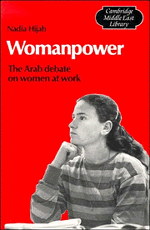Book contents
- Frontmatter
- Contents
- List of tables
- Preface
- List of abbreviations
- Introduction
- 1 The great family law debate
- 2 Cross-currents conservative and liberal
- 3 Arab women in the workforce
- 4 Jordanian women's liberating forces: inflation and labour migration
- 5 The Arab Gulf states: demand but no supply
- 6 Power past and future
- Bibliography
- Index
- Frontmatter
- Contents
- List of tables
- Preface
- List of abbreviations
- Introduction
- 1 The great family law debate
- 2 Cross-currents conservative and liberal
- 3 Arab women in the workforce
- 4 Jordanian women's liberating forces: inflation and labour migration
- 5 The Arab Gulf states: demand but no supply
- 6 Power past and future
- Bibliography
- Index
Summary
If a woman participates only in the national struggle, she'll have to start at square one after liberation.
Palestinian woman under Israeli occupationThe Arab debate on the roles of women is part of the effort to define the role of religion in society and what constitutes a ‘modern’ Arab identity. It is also part of the quest for economic development and national independence. I have argued that all the soul searching might have been cut short if there had been an urgent need for women's participation in the modern workforce. This has not happened, in my view, because the mode of development in the Arab world has not resulted in real economic opportunities for men or women. So the vicious circle continues: Arab women can only be truly liberated when Arab society is liberated politically and economically; and Arab society can only be truly liberated politically and economically, when it is liberated socially, which involves equal rights for women.
How much of a part can Arab women play in the process of reshaping the Arab world and in improving their own conditions? How do the existing women's groups function, and what are the alternatives? Radical change in any sphere is difficult, if not impossible, to achieve without the power to impose it. What power do Arab women have? What power are they likely to get?
- Type
- Chapter
- Information
- WomanpowerThe Arab Debate on Women at Work, pp. 138 - 165Publisher: Cambridge University PressPrint publication year: 1988



